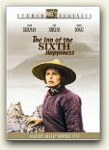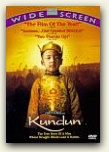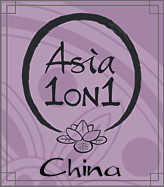|
|
|
|
The following list of books, DVDs, CDs, videos, newspapers, etc., are media that we can recommend to you if you are contemplating a visit to this country. We have tried to identify three books, including at least one guidebook, that we would most strongly recommend you read or at least browse before you go. If you have more time and interest you can get as deeply involved as you like. You may find some of these materials more relevant when you come back and want to get answers to questions that developed in-country. We also like to recommend various DVDs with films or documentaries that you should find educational. They will also give you a glimpse of the country before you actually arrive. Most of these items have a link to Amazon where you can purchase them if you like, but some materials are not available at Amazon (is that really possible?) and have links to other sites. We hope you find this list helpful.
|

|
Red Detachment of Women (Hongse Niangzijun)
By Cheng Yin
1971
One of only six movies made in China during Mao Zedong's Cultural Revolution (1966-1976), this film is a fascinating document of one of the 20th century's most tumultuous upheavals and an exemplar of Communist kitsch. Remade from Xie Jin's 1961 movie of the same name, this film retains all but the barest elements from its predecessor, distilling the material into blunt propaganda, relying on stock characterization, obvious iconography and no spoken dialogue. This Red Detachment of Women is a visually striking revolutionary opera/dance performance piece in which the actresses are clad in Mao suits, bayonets, and ballet slippers. The story, which takes place during the political chaos just prior to the Communist takeover (1927-37), concerns a peasant girl who endures pain and humiliation at the hands of an evil landlord, prompting her to join the communist rebels. This film was screened at the Venice Film Festival in 1971. --Jonathan Crow, All Movie Guide Top
|

|
White Haired Girl, The (Bai Mao Nu)
By <>
1972
This earnest propaganda ballet film from communist China has several things going for it. First, it retells a popular story. Second, it is well-choreographed. Finally, the camera work is good and it has good sound. In the story, a peasant girl is taken as property by a landlord in payment of taxes owed by her uncle, whom the landlord has killed. In the tax-collecting landlord's possession, the girl is terribly abused, and she runs away, foraging off the countryside. As she wanders, her hair turns white. Soon she joins the Red Army and gets vengeance on the murderous landlord. The dance style used in the movie is a combination of classical ballet with local acrobatic forms and mime. --Clarke Fountain, All Movie Guide Top
|

|
Xiu Xiu: The Sent Down Girl (Tian Yu)
By Joan Chen
1998
Actress Joan Chen makes her directorial debut with this bleak tale, adapted from the award-winning novella "Tian Yu" (heaven bath) by Shanghai writer Yan Geling, about the loss of innocence during Mao Zedong's brutal Cultural Revolution. Precocious Wen Xiu (16-year-old Lu Lu), playfully called Xiu Xiu by her friends, finds herself one of millions of Chinese teenagers sent to the hinterlands to receive specialized training during the early 1970s. She is taken from her loving family in Chengdu to the Tibetan steppes, where she is apprenticed to Lao Jin (Lopsang), a solitary master horseman whose legendary status stems partly from his prowess on the range and partly from an embarrassing secret resulting from a battle injury. Xiu Xiu longs to return to her family in Sichuan. Her growing desperation, coupled with her own naiveté, leave her vulnerable to the opportunistic scheming of a traveling peddler, who takes her virginity while promising her quick passage back home. Soon lecherous bureaucrats and others venture out to Xiu Xiu's remote yurt with the promise of free sex. The young girl willingly prostitutes herself, believing that it is the only way to see her beloved family again, while Lao Jin suffers silently, watching his love defile herself. Only after a medical emergency does Xiu Xiu realize how callously she has been used and cast aside. Joan Chen's dark work fits in a subgenre of Chinese art and cinema that explores the horrors of the Cultural Revolution, whose most famous examples include Tian Zhuangzhuang's Blue Kite (1993) and Zhang Yimou's To Live (1993). Though this film was screened in the 1998 Berlin Film Festival, it was banned in China for sexual and political content. --Jonathan Crow, All Movie Guide Top
|

|
Blue Kite, The (Lan Feng Zhen)
By Tian Zhuang-zhuang
1993
Tian Zhuangzhuang, a charter member of China's politically beleaguered, so-called Fifth Generation of Directors (along with Zhang Yimou, and Chen Kaige), made this film about the gradual disintegration of an entire family targeted by Mao's political reformation movements of the '50s and '60s. Told in a series of three stories, the audience sees little boy Tietou and his mother try and try again to rebuild their lives from the ashes left them by the madness of the era. Director Tian works from a palette of primary colors on widescreen images that are often fixed in an icy-white Kubrickian glare of omnipresent paranoia. Yet much of The Blue Kite is resplendent with palpable signs of ordinary life: noisy kids, happy weddings, and loud mealtimes. Tian amplifies the human element of these heady days, so that viewers may genuinely feel the humanity ripped from this story as events overtake and shatter all hope. --Tom Keogh, All Movie Guide Top
|

|
Farewell, My Concubine (Ba Wang Bie Ji)
By Chen Kaige
1993
Until Farewell, My Concubine, not many people were aware that most members of the Peking Opera were originally orphans or illegitimate castaways with nowhere else to turn. Such is the case of the film's protagonists, Duan Xiaolou (Zhang Fengyi) and Cheng Dieyi (Leslie Cheung), two homeless outcasts, trained from childhood in the grueling rigors of the Opera by master Lu Qui. The film traces the 52-year friendship between Xiaolou and Dieyi, a friendship pockmarked with fiery conflicts and tender reconciliations. Though the delicate Dieyi specializes in female roles and the gutsy Xiaolou plays noble warriors, theirs is an essentially heterosexual relationship; still, when Xiaolou takes upon himself a prostitute bride (the magnificent Gong Li), Dieyi is as petty and jealous as an outcast mistress. Farewell, My Concubine holds the viewer in thrall from start to finish; as such, it is thoroughly deserving of its many international film awards and nominations. Surprisingly, this worldwide success was something of a flop in its home country of China; perhaps it hit too close to home for those viewers who'd lived through the same years so painstakingly recreated in the film. --Hal Erickson, All Movie Guide Top
|

|
Ju Dou
By Zhang Yimou (Yimou Zhang), Fengliang Yang
1991
A dark, sensual, and visually sumptuous drama, Ju Dou centers on the title character, the third wife of a wealthy silk dyer in 1920s China. Forced into marriage by poverty, Ju Dou is repeatedly mistreated and cruelly disciplined by her husband, Jin-shan, for failing to bear him an heir. Her suffering attracts the sympathy of Jin-shan's younger, kinder nephew, Tian-qing, and the two begin a secret affair that could have tragic consequences. Spanning the course of many years, the film's narrative takes several surprising turns, defying expectations and complicating audience sympathies. None of the film's characters is wholly heroic or evil, allowing all three central performers--Li Bao-tian as Tian-qing, Li Wei as Jin-shan, and the luminous Gong Li as Ju Dou--to fashion memorable, complex portrayals.
Met with controversy in China due to supposed political overtones that worried government officials, Ju Dou received fairer treatment overseas, winning an Academy Award nomination for Best Foreign Film and numerous festival prizes. --Judd Blaise, All Movie Guide Top
|

|
King of Masks, The
By Wu Tian-Ming (Tian-Ming Wu)
1999
This tender Chinese tale of an aged street performer who begins teaching a young child is filled with warm humanity, but not imbued with undue sentiment. It is set about seventy years in the past and centers on elderly Wang Bian Lian, who travels the street performing with his pet monkey. Just looking at him it would be hard to tell that he is a master of the rapid changing face masks technique that characterizes Sichuan opera. He came to the streets thirty years before, after his wife abandoned him, and now he seeks to pass on his technique to a young boy. Liang, a well-known actor specializing in female roles wants to learn the skill, but Wang politely refuses to teach him. Wang finally gets his candidate when he buys "Doggie," a young child from a starving family. ...One day the child falls ill and Wang sells one of his few priceless heirlooms to save him. This leads him to learn that Doggie is not a 'he' at all. Wang still cares, but he is heartbroken, for only a boy can learn the face-changing skill. Doggie...flees into the city only to secretly return later with a baby boy that she had rescued from kidnappers. Wang, not knowing who bestowed the gift of the child, is delighted. Unfortunately, the child's wealthy parents learn that he has it. Wang is arrested and sentenced to death. Fortunately, Doggie is determined to save him. --Sandra Brennan, All Movie Guide Top
|

|
Raise the Red Lantern
By Zhang Yimou (Zhang Yimou)
1991
Though the film was the topic of great political controversy in China upon its release, it received armfuls of awards from Belgium, Italy, and the United Kingdom, as well as an Academy Award nomination.
This sumptuously photographed drama, set in Northern China in the 1920s and based on the novel Wives and Concubines by Su Tong, stars Gong Li as Songlian, the fourth wife of an elderly landlord. Songlian is a college student who has been married off by her stepmother, so it is with tremendous frustration that this woman, who had hopes of using her education to broaden her horizons, now finds herself reduced to a small enclosure at the beck and call of her husband. Despite being given a maid (Kong Lin) and luxurious surroundings, she feels trapped inside the cheerless walls. Upon her arrival, Songlian realizes that she must keep one step ahead of her rivals, the three other wives.... Raise the Red Lantern is a moving exploration of power in a suffocating world of ossified tradition and naked ambition--a masterpiece of 1990's world cinema. --Paul Brenner, All Movie Guide Top
|

|
Red Corner
By Jon Avnet
1997
This is the story of an American media lawyer who is wrongfully arrested while he is on business in China and ends up on trial for murder. His only hope of regaining his freedom resides in a female, court-appointed Chinese defense attorney who fights the entrenched system of corruption in which he has become entangled. Top
|

|
Red Sorghum (Hong Gaoliang)
By Zhang Yimou
1987
Red Sorghum was the first directorial effort of controversial Chinese filmmaker Zhang Yimou. The director's favorite leading lady Gong Li plays a young woman of the 1920s whose family sells her into marriage with a wealthy winemaker. At first a loveless union, the relationship blossoms into one of strong friendship and mutual respect. During World War II, Gong Li fights side by side with her husband against the invading Japanese. A sweeping yet intensely personal historical epic, Red Sorghum won the 1988 Golden Bear award at the Berlin Film Festival. Despite its patriotic overtones, the film was heavily censored (when not banned altogether) in certain provinces of Communist China. --Hal Erickson, All Movie Guide Top
|

|
To Live (Huozhe)
By Zhang Yimou (Yimou Zhang)
1994
Zhang Yimou, often regarded as China's leading contemporary filmmaker, directed this drama chronicling the ebb and flow of one family's fortunes, set against the backdrop of China's tumultuous history between the 1940s and the 1970s. Fugui (Ge You) is the father of a once-wealthy family whose addiction to gambling and chronic bad luck causes him to lose his home in a game of dice with Long'er (Ni Dabong). Fugui's wife Jiazhen (Gong Li) abandons him, and he finds himself working as a peddler, until the man who now owns his home gives him a pair of shadow puppets. Fugui learns the art of puppetry and travels as a performer; while on the road, he is arrested by Nationalist forces, until he is liberated by advancing Red Army factions, and he comes home to his wife and children as they adapt to the nation's new leadership. While once a lazy spendthrift, Fugui vows to change his ways, and he struggles to become a better worker and citizen. But Fugui and his family soon realize that there is adversity waiting for them around every corner, and the onset of the Cultural Revolution makes it clear that China's new regime can be as corrupt and callous as the old order. While a Grand Prize winner at the 1994 Cannes Film Festival and recipient of the Best Foreign Language Film award at the 1995 BAFTA Awards, To Live did not fare well in its homeland. Chinese censors objected to the film's commentary about political abuses in China's past, as well as Zhang Yimou's attempts to present the film at several international festivals. As punishment, he was forced to write a formal apology and was not allowed to make another film for two years. --Mark Deming, All Movie Guide Top
|

|
55 Days at Peking
By Nicholas Ray
1963
Charlton Heston leads a multinational force of soldiers to free the foreign legations surrounded in Peking during the 1900 Boxer Rebellion. Top
|

|
Empire of the Sun
By Steven Spielberg
1987
Empire of the Sun is based on J. G. Ballard's autobiographical novel about a spoiled young British boy living in pre-World War II Shanghai whose life changes dramatically during the Japanese occupation. Top
|

|
Good Earth, The
By Victor Fleming & Sidney A. Franklin
1937
Classic, Oscar-winning black and white film based on Pearl Buck's famous 1933 novel about a Chinese farming family's lives as they are torn apart by poverty, greed, and natural disasters. Top
|

|
Inn of the Sixth Happiness, The
By Mark Robson
1958
The Inn of the Sixth Happiness is based on an Alan Burgess novel about a female missionary in 1930's war-torn China and the two Chinese men in her life who helped her bring a large group of Chinese children to safety through difficult mountains while they were being pursued by the Japanese. Top
|

|
Kundun
By Martin Scorsese
1997
The beautifully told story of the life of the present Dalai Lama. Top
|

|
Last Emperor, The
By Bernardo Bertolucci
1987
The Last Emperor is based on the life of the last Emperor of China, Pu Yi, during the period from 1908 to his death in 1967. Winner of nine Academy Awards. Top
|

|
Love is a Many-Splendored Thing
By Henry King
1955
This 1955 movie is based on Han Suyin's autobiographical novel about a female Eurasian doctor (the widow of a Nationalist general) and her romance with an American war correspondent. It takes place in racially-segregated Hong Kong during the closing days of the Chinese Civil War. When they begin to fall in love, their friends and her Chinese family pressure them to end their cross-cultural relationship.
Top
|

|
Red Lantern
By Albert Capellani
1919
In this atmospheric Chinese tale, Alla Nazimova plays Mahlee, a half-white, half-Chinese girl educated in Western ways by missionaries. She falls in love with one of the missionaries' sons, but he spurns her for an American girl (also played by Nazimova). The Chinese girl seeks revenge against the white race by falling in with the Boxers. Acting as the Goddess of the Red Lantern, she imparts various prophecies, none of which come true, and she commits suicide. The grandeur of the Oriental settings that were created for this drama overshadow even the intense posturing of Nazimova--no mean accomplishment! --Janiss Garza, All Movie Guide Top
|

|
Sand Pebble, The
By Robert Wise
1966
This is the story of an American sailor serving on an American gunboat on the Yangtze River in 1926 as civil war breaks out in China. Top
|

|
Seven Years in Tibet
By Jean-Jacques Annaud
1997
Seven Years in Tibet is based on the real life story of an Austrian mountain climber, Heinrich Harrer, who embarks on a Himalayan expedition in 1939 only to be arrested by the British as war breaks out. He and several others escape to Tibet where he becomes a tutor to the young Dalai Lama. Top
|

|
Tai-Pan
By Daryl Duke
1986
Tai-Pan is chinese for "supreme leader" and in this movie, based on James Clavell's best selling novel about the battle for control of the China trade in early 19th century Hong Kong, Tai-Pan Dirk Struan is obsessed with a plan to make Hong Kong the "jewel in the crown of her British Majesty." Top
|

|
World of Suzie Wong, The
By Richard Quine
1960
Tragic story about an American architect who comes to Hong Kong to paint. He meets a local prostitute who models for him and they become romantically involved. Top
|
|
|
|
|
|






